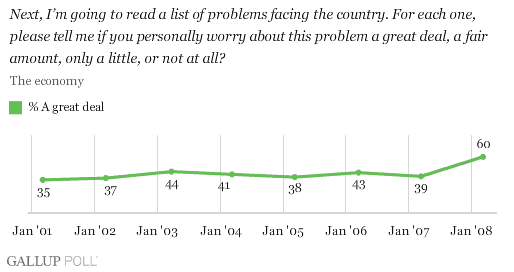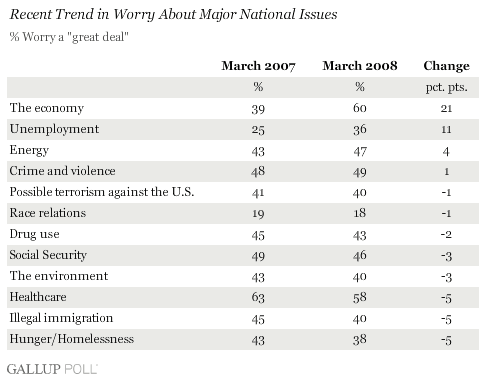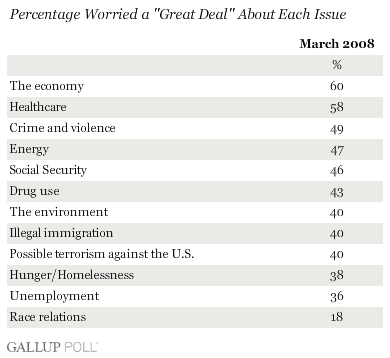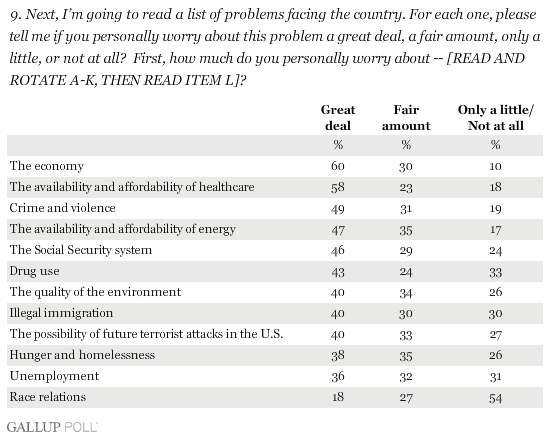PRINCETON, NJ -- The percentage of Americans saying they worry "a great deal" about the economy has surged by more than 20 points over the past year, moving the issue from 6th on the list of 12 national issues measured in 2007 to tied for first today with healthcare.

Gallup updates public concern about major issues confronting the country each March as part of its annual Environment survey. The only other issue for which Americans' level of concern increased a significant amount since 2007 is unemployment, a major economic sub-issue. Concern about the remaining 10 issues either held steady (as did energy, the environment, and race relations, among others) or declined slightly (healthcare, illegal immigration, and hunger/homelessness).

Aside from the economy's ascension to the top of this year's list, the 2008 ranking of issues is similar to that of 2007. Healthcare remains a dominant concern. Last year it was ranked No. 1, with 63% worried a great deal, far ahead of Social Security, in second place with 49%. This year, healthcare ties the economy for first, with only a two-point difference in the percentage worried about each: 60% for the economy and 58% for healthcare.
Several issues are clustered in the 40% to 49% range as secondary concerns to the economy and healthcare this year. These are crime, energy, Social Security, drug use, the environment, illegal immigration, and possible terrorism against the United States.
Slightly fewer than 40% of Americans say they worry a great deal about hunger and homelessness or unemployment.
Only 18% rate race relations as a major concern. Race relations is the only issue about which the majority of Americans say they worry only a little or not at all.

Economic anxiety has grown fairly uniformly across various segments of the American public. In March 2007, fewer than half of men and women, as well as adults in all major age groups, and Republicans as well as Democrats were worried a great deal about the economy. Today, half or more in each of these demographic categories say they worry a great deal about it.
For each of the past two years, women have been more likely than men to say they worry about the economy (64% vs. 57% in 2008), and Democrats have been much more likely than Republicans to be worried (72% vs. 52%).
Other areas for which Gallup finds significant gender differences -- all with women more concerned than men -- include healthcare, crime, the environment, drug use, the possibility of terrorist attacks, unemployment, and hunger/homelessness.
The worry ratings for most issues are characterized by significant partisan differences, including seven (in addition to the economy) for which Democrats express more concern than Republicans: healthcare, energy, Social Security, the environment, hunger/homelessness, unemployment, and race relations. Republicans express more concern than Democrats about only two issues: illegal immigration and the possibility of future terrorism against the United States. Republicans and Democrats express about equal levels of concern on the issues of crime and drug use.
Survey Methods
Results are based on telephone interviews with 1,012 national adults, aged 18 and older, conducted March 6-9, 2008. For results based on the total sample of national adults, one can say with 95% confidence that the maximum margin of sampling error is ±3 percentage points.
Interviews are conducted with respondents on land-line telephones (for respondents with a land-line telephone) and cellular phones (for respondents who are cell-phone only).
In addition to sampling error, question wording and practical difficulties in conducting surveys can introduce error or bias into the findings of public opinion polls.


